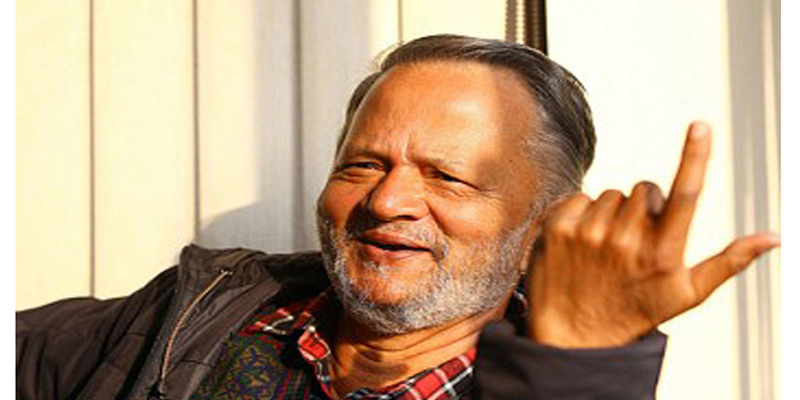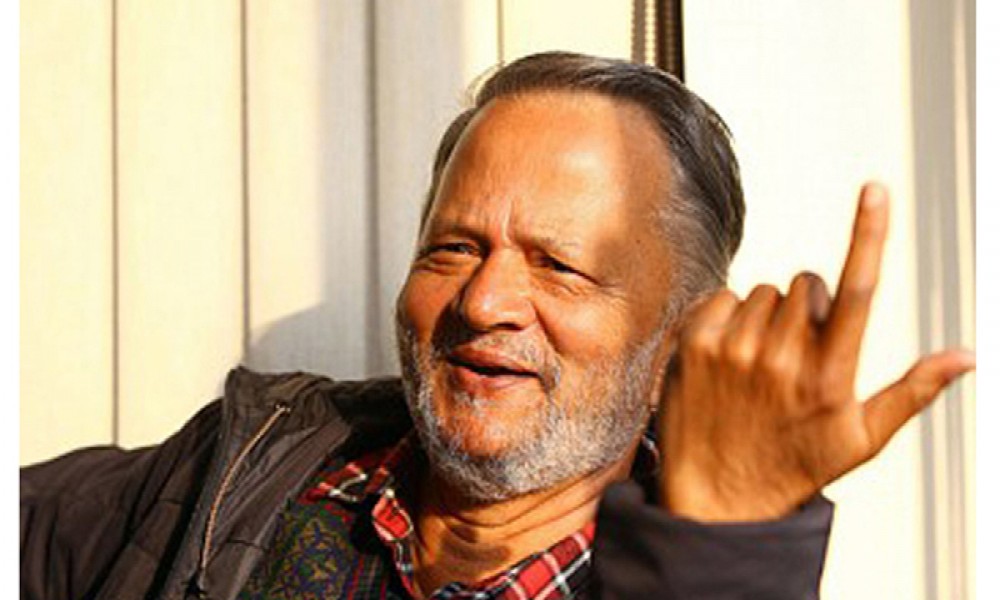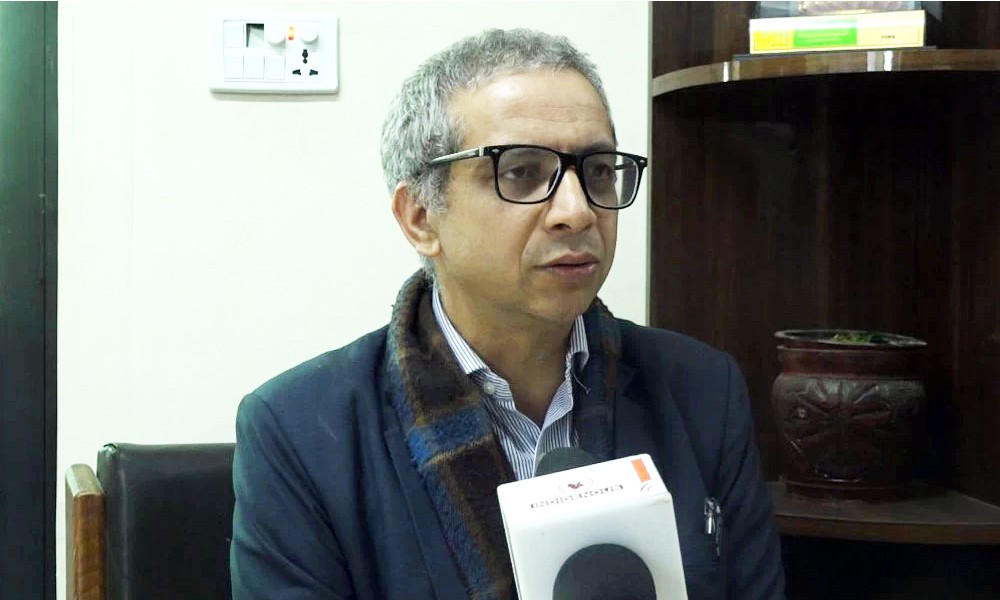Like all Nepali people, Prof Pitambar Sharma, a noted scholar, is dismayed by failure of political parties to forge consensus on the key issues of the new constitution. He believes that the political parties viewed federalism just as a political agenda without having an intense and wider discussion on it. In a conversation with journalists, he emphasizes the need to recognized identity while federating the country. Here are excerpts of his conversation carried out by Kantipur daily.
How do you see the current political situation?
The country would not have been stuck like this if the top leaders of major political parties were serious. They often hold meetings but never touch upon the main theme or agenda. It has been happening for a long time. All political parties stick to their guns. They enjoy wine and dine in the name of holding dialogues for reaching consensus but never enter the depth of issues, intending to forge consensus.
Do you think Constituent Assembly (CA) did what it was supposed to do during its tenure?
I don't believe it did. In the CA, political parties put forth their opinion but I don't believe they discussed the issue in a democratic way. Meetings take place, four leaders put forth four different opinion. Their opinion is same as it used to be before, same will be in future. The CA was apprehended by leaders of major political parties. We hoped that the peoples' representatives would come together and discuss the contentious issues democratically and forge a consensus for the betterment of people and the country. But, this never happened. It looked like they still had the hangover of parliamentary system. There was political whip. The so-called peoples' representatives attended the house with their political agenda and never gave a thought to the mandate and the objective of CA.
The first CA was dissolved with no results. Can we once again forge consensus going through a due process?
Each and every Nepali wants to see their ownership over the new constitution. They wanted the CA to get their interests and rights addressed. The due process is in itself not bad but it is also not good that in the name of due process they decide something against the will of majority of people. If it is so then, there is no meaning to have a CA.
So, is it due to lack of political will?
Perhaps, there are many other aspects. But, I did not see seriousness on the part of political leaders. I have not seen any political leaders bringing the agenda intending to forge consensus. They throw their viewpoints but never give logics as to why they are saying what they are saying, what were the reasons behind so many movements that took place in the past. I agree to link north and south as they argue. It may address the issue of capability, but will not address the issues relating to the identity. We have to find out such solution which addresses both the identity as well as the capability.
NC and UML have taken stance to make 7-provinces. I can agree upon making a few provinces because federalism itself is the expensive ruling system. But the demand in Nepal is diverse community want to see their reflection in the state. Therefore, we have to consider why federalism is necessary for Nepal. I may have one understanding; NC may have another, so as UML or Maoist. See, the proposition of 14-provinces was that of existing UML leaders in the first CA, but now UML is hell bent on 7-provinces. The behavior of NC is also no different. It once had anticipated 13 provinces. UCPN-Maoist tabled the federalism agenda and we are compelled to be involved in it.
NC and UML say no to ethnic federalism, while UCPN-Maoist and Madhesi parties say no consensus without it, where do you see the middle point for forging consensus?
Both have extreme points. In the first place, UCPN-Maoist should not have raised the issue of ethnic federalism. Instead, it should have called for reflection of linguistic, ethnic and cultural diversity in the ruling system. They first raised agenda of prerogative rights of those ethnic groups which are in the majority in the state. They are now apprehensive about this very agenda. Other groups don't even want to listen to the issues of ethnicity. It is true that autonomy cannot be given to all ethnic and caste groups but each and every ethnic and caste group wants their language and culture protected. It may not be possible to protect all but there is nothing wrong in preserving culture and language of all major castes and ethnicities. The negativity has arisen especially from the mindset or attitude of so- called upper castes —Bahun and Chhetri. They believe that language and culture of ethnic caste group is protected or if the country is restructured on the basis of ethnicity, they would lose everything, but this is not true. The deadlock here is just because of names. Nobody here is demanding the ethnic state. The ethnic state is created in such a situation where only one or two ethnic and caste group rules the state and others become like a second citizen. The fact is, existing state is ethnic state, which has been ruled by a single caste/ethnic group for centuries.
The negativity has arisen especially from the mindset or attitude of so- called upper castes —Bahun and Chhetri. They believe that language and culture of ethnic caste group is protected or if the country is restructured on the basis of ethnicity, they would lose everything,
Why has there been dispute then? is it because of failure to make others understand about the issue?
This is not because of failure to make another understand; rather it has been so intentionally. I always have debate among our colleagues in the same issue. Who is demanding an ethnic state here? Limbuwan perhaps is only a political party demanding ethnic federalism. But read its manifesto. They have not said Limbuwan should only be the state of Limbus. They have not said to go beyond the democratic system. They have not demanded the right to self-determination and prerogative right with secession; rather they have said to have shared rule, equal protection of all language and culture within Limbuwan. Political parties are bias towards federating country on the basis of ethnicity.
Don't you think that they are also saying of special privileges of one ethnic/caste group?
In a democratic system, no special privilege for one or a few group, where every caste and ethnic groups has to have a chance to grow. We have to respect to take the consent of others before deciding anything that is affecting them.
There was then consensus to federate a country with a mixed system by addressing both capability and identity; do you think there will be agreement again in this?
I don't see any difficulty in naming provinces mixing with two-names. We can make Kirat Province of Diverse Community, this will reflect identity of Rai, Limbu, Sunuwar indigenous nationalities. There will be problem if we talk only federating country on the basis of capability, because there are only 7-districts, from where the largest portion of revenue is generated. And, there will also be problem if we federate the country by demarcating north-south border, even if it seems suitable on the basis of capability as the trade, commerce and transportation has north-south linkage. Because, let us see, Tharu indigenous peoples are demanding 'Tharuhat' provinces, Limbus for Limbuwan. Therefore in order to find the mid way we have to forge consensus.
UCPN-Maoist and Madhesi parties seem flexible enough if NC and UML agree upon the issue of inclusion, what is your say in this?
Give and take in itself is nonsense. There is no give and take in the principle. When the political parties involve in the give-and-take game, it is clear enough that political leaders are not in favor of principle. State restructuring, electoral system, executive power sharing are interconnected issues. If we mishandle one, it will have effects on another. NC and UML have brought 7-province proposal which is the most dangerous one.
The chairperson of Political Dialogue and Consensus Committee (PDCC), Baburam Bhattrai, time and again said to agree upon the proportional system in electoral system, which did not come into the wider discussion. Aged political leaders don't want to leave their position thus don't want to find alternative of parliamentary system. Thus, they opine that country will face problem if the parliamentary system is ended. If we opt for the presidential system, there will be one but progressive leadership. But the political leaders never ever gave a thought to this.
Why do leaders express in such a way that negatively affects on others' dignity?
It is nothing but immaturity. You journalists would also love to blow it out of proportion and political leaders would love to be popular.
Who is demanding an ethnic state here? Limbuwan perhaps is only a political party demanding ethnic federalism. But read its manifesto. They have not said Limbuwan should only be the state of Limbus. They have not said to go beyond the democratic system. They have not demanded the right to self-determination and prerogative right with secession; rather they have said to have shared rule, equal protection of all language and culture within Limbuwan.
It first aimed to make a new Nepal through restructuring of country, do you think it is now in shadow?
The restructuring of State means re-thinking of the country's structure with having farsightedness. But, the thinking is to restructure of yester-years structure. New Nepal means newer thinking and newer vision.
Do you think the agenda of holistic change is ended?
Right from the beginning, we were not clear about the holistic change. We talked big-big things, we never talk of important things such as how development takes place, and how people are empowered. The political leaders even now don't talk about local levels while discussing about the federalism. They talk to give right to the federal state level, but don't talk about the power of the lowest level. Adivasi Janajati and Madhesis debate to have power in the federal state and want to make Singadurbar (another central of decision making) for federal states, is that the new vision and vision of new Nepal. The holistic changes are something of making such a changes which ensures that every child has access to education, health and be able to have equal opportunity for fullest growth, the holistic change is something, we can best utilize our resources and bring development and positive change in the lives of every Nepali, no any citizen is discriminated, excluded. Federation alone is not enough to bring such a changes, it is only the means to achieve such a ends.
How just is it to suspect the political leaders like this?
No, they created this situation themselves. Public trusted them for long and still they have, otherwise, how would they get such huge votes in the election, but the political leaders forgot to fulfill their responsibilities.
How do you observe the role of NC, UML and UCPN-Maoist leaders in the constitution writing?
I am not much familiar with others except with Baburam Bhattrai. I don't think any leaders have played good role in writing constitution. The leaders are not serious. One another is awaiting of their turn to reach the topmost position.
NC leader Sher Bahadur Deuba has said to agree upon the Interim Constitution, what do you say in this?
It is better to adopt the provisions of Interim Constitution rather than adopting a Constitution like that of 1991. I don't mean, Interim Constitution 2007 is best. If we can bring into the practice of everything as provisioned in the Interim Constitution, it is much better than having nothing. We hoped big, as leaders vowed that they would unveil Constitution within a year. The issues are same, leaders are same. No one is serious of their commitments.
If the first CA had brought Constitution, the Country would lead to the progress, right?
The country would take into one course. Even if the Constitution is written anytime soon, there will be transition period for more than 6/7 years. If the political parties again have dispute within themselves, the period will be extended. Because, there will not be a coalition government.
How positive are you in writing a new Constitution any time soon? What would be the middle path that the political parties reach the consensus?
I am not positive. How can one bring Constitution by avoiding another. In order to follow even a due process, there should be consensus. The Chairman of the CA cannot take own stand and bring Constitution. The ruling parties are not willing to hold election anytime soon. UCPN-Maoist and Madhesi political parties don't have any preparation. The middle path could be having consensus on making a less number of provinces but on the basis of identity as well as capability. It is necessary to consider the diversity of the country. But, majority is not thinking this way. Even if there is not directly elected President and Prime Minister, we want to see progressive parliamentary system. There should be mix-electoral system with proportional representation; this should be wider discussion in this, which has not yet happened.

The present political deadlock is said to have been, due to the international power/actors, what is your opinion?
It is easy to blame others rather than tidying up our house and pute everything in order. Our house is in a mess not because of others but because of ourselves.
What is your observation in polarization of political parties?
It is one of major reasons why constitution has not been written yet. This will stimulate violence in future.
It is said that the country will progress, if the youth lead, what is your opinion?
We human beings are young not because of age but because of vision. The age will encourage us to think to move forward. Hundreds of old men can dream but it is youth who execute such dreams. The youth will not be able to do oneself, but who has deeper knowledge understanding of history, geography, diversity and situation of the country. But, today's youth are better merely in vocal not in action. I am not familiar with all young leaders but I have not found any young leaders who have a vision of development of country.
Do you think there is shortage of such leaders in Nepal?
Perhaps, there are such leaders in the country, but there have been many changes in education, science and technology. But, I mean, there is not a system in our country. There is still a system, whereby one cannot find job of office assistant without the recommendation of a political party. I don't mean that party-less Pachayat era was better, but there are a lot of ill systems in our country.
Is it because of lack of political culture?
Yes it is. Here is lack of political culture. There is lack of political leaders who teach good political culture.
What is the role of intellectuals?
The intellectuals are born and raised in same system.
Don't you think, even Civil Society is silent spectators in this?
There is political influence in it.









